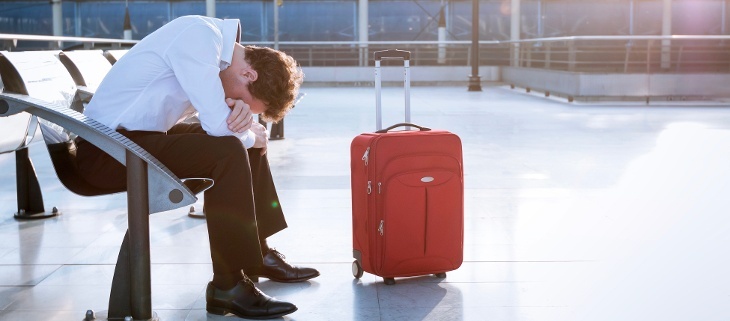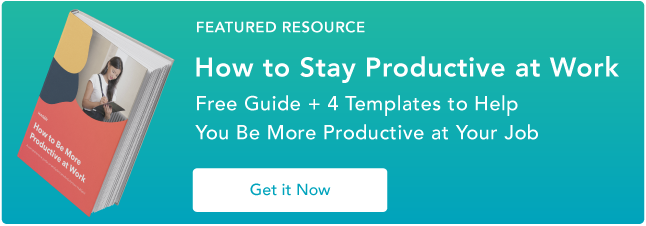
I recently read that 45% of Millennials want to travel more for business.
Are they crazy? I mean, I get it. Travel is an opportunity to do something different -- to have an experience. But as someone who spent considerable time in seemingly endless business travel, I understand the frequent (non-recreational) flyer’s lament.
While it's necessary in moderation, it takes its toll -- studies show that frequent business travel makes us age faster, not to mention, more prone to cardiovascular disease. And as if that weren’t enough, constant flight exposes us to what the Harvard Business Review calls “pathological levels of germs and radiation.”
It doesn’t have to be that bad -- there are ways to stay healthy on the road. By turning these tips into habits, you might not only decrease your chances of getting sick, but business travel can even become an exercise in prioritizing effectively, sleeping better, and learning to make time for yourself.
(Note: These tips are not intended to be substitutes for medical advice -- they're for educational purposes only. Consult your healthcare professional before making any health, medical, or other decisions based on the data within these tips.)
Why Business Travel Is Making You Sick (And What You Can Do About It)
You’re not eating healthily -- which is trickier than it looks.
While your brain might require more calories during these intense periods of travel -- and want to reward itself with airport junk food -- you have to feed it the right kind of sustenance. That means consuming healthy snacks, and not the salty, sugary ones that we usually find on the road.
HubSpot’s VP of Marketing Meghan Keaney Anderson recommends packing healthier options for yourself. “They don’t take up much room,” she says, “and will get you through those long trips.”
Back when I had to travel nearly every week for work, if I didn’t have any meals planned with colleagues or clients, I would bring homemade freezer meals: Portable containers with grilled chicken strips, green beans, and sweet potatoes that I would freeze and throw in my carry-on when it was time to leave.
Make-ahead meals like that are especially helpful if you’re going to be on the road for several days -- just call your hotel ahead of time and ask if there’s a refrigerator or microwave in your room. If there isn’t, you can request one -- hotels are usually happy to oblige.
You don’t know what’s nearby.
To piggyback on the importance of healthy eating, it helps to know what’s near the place you’ll be staying. That might not be up to you -- it’s often up to your client and boss to dictate lodging, especially when you have to stick to places that have a specific corporate rate.
However, with the help of sites like Yelp and Google Maps, it’s easy to make a spreadsheet or list on your phone of what options are available near each hotel you stay at.
If you are able to pick where you stay, “book hotels in downtown areas,” Anderson recommends. “It might be tempting to book the hotel closest to the airport, but staying downtown will minimize your reliance on cabs and let you see the true city.”
You’re not working out.
The benefits of exercise aren't exactly a secret. Not only can it help you stay healthy on the road -- especially if you find yourself tempted by food that you wouldn’t normally eat at home -- but exercise can even mitigate the effects of jetlag.
Depending on how early your day starts -- and any evening obligations you might have -- that could mean getting up at 4:00 a.m. to fit in a workout. That can be tough if you’re out the night before, trying to impress your boss and schmooze with clients.
But there are ways around that. Try to sneak in a workout after dinner, especially if you just can’t bring yourself to get up so early the next day. (Don’t like going to the gym? Toss some 2-lb dumbbells into your suitcase and find some short exercise videos online that you can do from your hotel room.)
These workouts can be quick -- my colleague Lindsay Kolowich has some tips for effective spurts of exercise that add up when you do them throughout the day, even if you’re stuck at a desk (and won't make you look weird).
Finally, try not to drink too much with dinner. Not only can alcohol derail your efforts to eat healthily, but it’s known to impair your sleep quality by messing with your sleep cycles, especially the REM (Rapid Eye Movement) stage -- that's crucial to things like learning and balancing your mood.
(And if you're being pressured to get boozy with colleagues or clients, maybe it’s time consider a career change.)
You’re not sleeping enough.
This step can be tough -- see above.
Some people just don’t sleep well in hotels, and that’s completely normal. It’s actually the result of what researchers call the “first night effect,” and it results from a tendency of mammals -- like dolphins and whales, for example -- to sleep with just one half of their brains at a time, while the other half stays awake and alert.
Humans do this, researchers believe, when we’re in a new environment -- we’re more alert, so we can respond to unusual stimuli, or "signs of danger."
When I noticed that was starting to happen to me, I found it helpful to do something completely unrelated to work before turning in for the night. It can be hard to step away -- after all, that’s why you’re on the road. But as a start, don’t look at any of your devices, as that’s been known to disturb your circadian rhythm and keep you awake.
Instead, take advantage of the hotel’s free HBO, or read something relatively mindless -- for me, that was usually a home and garden magazine. At the very least, it distracted me from any stress leading up to my commitments the next day, like a big meeting or presentation. And since stress often leads to sleeplessness, as it does for 33% of adults, that helped to mitigate the “first night effect."
You need to chill out.
We’ve already covered how important stress management is when it comes to your quality of sleep. But remember all those healthy eating tips we shared? Stress can seriously hinder those efforts, too.
There’s a reason why phrases like “stress eating” and “comfort food” are common in our vernacular -- in the period of one month, nearly every two in five adults admits to overeating or indulging in unhealthy foods as a result of stress. Combine that with being in a less controlled environment -- where there’s a stocked mini-fridge, for example -- and we’re much more likely to turn to unhealthy snacks for relief.
But between packing your own food, getting a workout in between client obligations, and getting enough sleep, how the heck are you supposed to find time to even breathe, let alone relax?
Well, here’s where you might have to switch around some priorities. If healthy eating is more of a priority to you than fitting in exercise, then you can use that time to unwind. Maybe the hotel has a pool where you can decompress for a bit, or even a spa that you can use to your advantage.
Otherwise, fit in the relaxation where you can. It might sound impossible, but studies have shown that even 16 minutes of relaxation exercises can help people more effectively cope with stress.
Plus, there are several stress management apps that make it possible to take a mini-relaxation break anywhere. Check out our rundown -- a lot of them are free.
You’re not planning your time wisely.
We’ve all heard about the benefits of time management -- and I don’t know about you, but I feel better when I have at least a rough idea of what my day will look like.
I use a technique called time blocking, which means I put appointments in my calendar for my own time -- things like working out and taking a coffee break, for example. According to some studies, writing down your goals like this can actually improve the likelihood of you actually achieving them.
So while our plans might go awry, scheduling things in advance, at a minimum, gives us a better idea of how much time we have to get them done.
That’s why time management is so valuable during business travel. There’s a lot to fit in during a condensed period of time -- by planning these items out on a calendar, you can better prioritize what’s most important to you, whether that’s exercising or using that time for relaxation.
And if you’re having trouble setting priorities, try this two-minute test that will help you determine them.
Time to hit the road …
It might seem like a long list. And it might seem like way too much to take care of when your time is already limited. But it’s okay if you have to pick and choose different tips here, and that’s why we keep harping away at prioritizing. If you have to skip a step, don’t beat yourself up for it -- when it comes to correcting less-than-desirable habits, self-forgiveness is much more effective than guilt.
Before you head out, know what’s available to make your trips a little easier. Find out if your hotel offers things like laundry service, in-room yoga, or something as simple as an in-room coffee maker. Having those resources on hand will reduce the amount of time you have to spend looking for them or retrieving them elsewhere.
Happy trails! We’re here to provide tips wherever we can. Do you have a favorite business travel hack? Share it in the comments.

from HubSpot Marketing Blog http://blog.hubspot.com/marketing/business-travel-health-tips
Via http://blog.hubspot.com/marketing/business-travel-health-tips
No comments:
Post a Comment